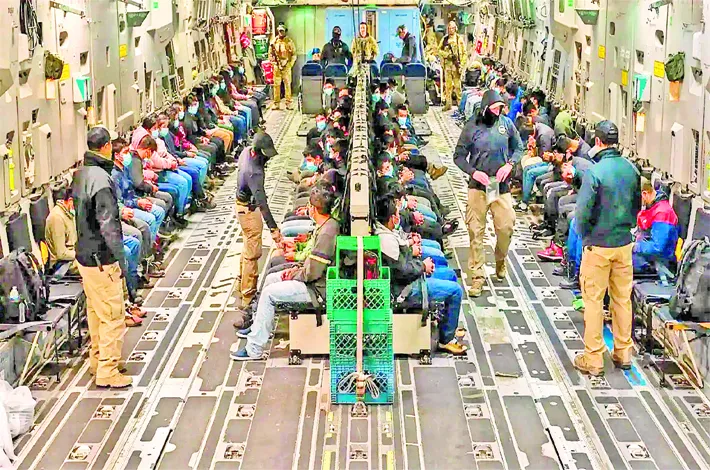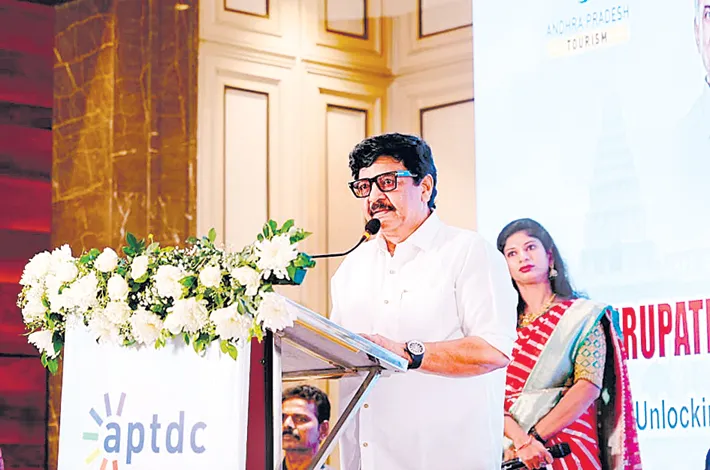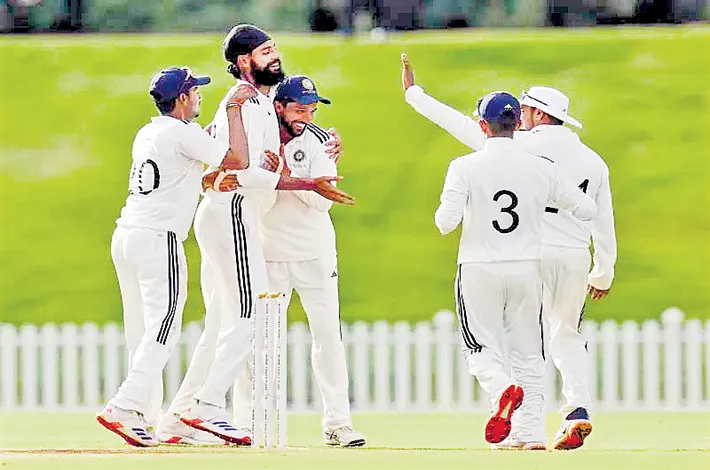Politicians Decry Deportation method
07-02-2025 12:00:00 AM

Demand a balancing act between dignity and diplomacy
The recent deportation of Indian nationals from the United States has sparked a significant response from politicians across the political spectrum in the country. This issue, highlighted by the actions of the Trump administration since its return to office, has not only put a spotlight on the complexities of international immigration policies but also on India's diplomatic relations and internal political dynamics.
Background of the Issue
Under President Donald Trump's directive, the U.S. has initiated what has been dubbed as the largest deportation operation in its history, targeting undocumented immigrants, including a considerable number from India. Reports indicate that a military plane carrying 205 Indian nationals was dispatched from San Antonio, Texas, to Amritsar, Punjab, signaling the beginning of this aggressive policy. The move has been part of a broader strategy to enforce border security and tighten immigration laws, which has stirred various reactions within India.
Congress's Outcry
Congress MP Priyanka Gandhi Vadra on Thursday slammed the government for the way Indians staying illegally in the United States were deported and demanded that Prime Minister Narendra Modi and External Affairs Minister S Jaishankar must answer on the issue.
A US military aircraft carrying 104 illegal Indian immigrants landed in Amritsar on Wednesday, the first such batch of Indians deported by the Donald Trump government as part of a crackdown against illegal immigrants. The deportees claimed their hands and legs were cuffed throughout the journey and they were unshackled only after landing at the Amritsar airport. Congress general secretary Priyanka Gandhi said, "A lot of things were said that Modi ji and Trump ji are very good friends.
Why did Modi ji let this happen, couldn't we have sent our plane to get them." "Is this the way one should be behaving with people that they are sent back in handcuffs and chains," he said. Asked if the External Affairs Minister should give an answer, she said, "He should answer, the PM should give an answer. Is this the way?"
Prominent voices from the Indian National Congress have been vocal in their critique of the manner in which the deportations were conducted. Congress leader Pawan Khera condemned the treatment of the deportees, recounting past incidents like the 2013 handcuffing and strip-search of Indian diplomat Devyani Khobragade, which led to significant diplomatic friction. Khera emphasized the humiliation faced by the deported Indians, drawing parallels to previous retaliatory actions by the Indian government against perceived injustices.
Shashi Tharoor, another prominent Congress MP, articulated a nuanced stance, acknowledging the U.S.'s legal right to deport illegal immigrants but strongly protesting the methods used. His comments reflect a broader sentiment within the opposition that while legal mobility should be encouraged, the process of deportation should respect human dignity.
Shiv Sena (UBT)'s Perspective
Shiv Sena (UBT) MP Priyanka Chaturvedi echoed similar sentiments, decrying the dehumanizing treatment of the deportees. She highlighted the inhumane conditions they were subjected to during the flight, including being chained and denied basic facilities like restroom access. Chaturvedi's remarks underscore a critique not just of U.S. policy but also of the Indian government's apparent inaction in protecting its citizens abroad.
Government's Stance
On the other hand, the BJP-led government, represented by External Affairs Minister S. Jaishankar, has adopted a more diplomatic approach. Jaishankar has stated that India has always been open to the legitimate return of its citizens who are found to be residing illegally in foreign countries. His comments during a Rajya Sabha session suggested a focus on fostering legal mobility while discouraging illegal movements, a stance that aligns with India's broader foreign policy objectives of maintaining good relations with the U.S. while safeguarding its nationals' rights.
The Indian government's cooperation in verifying the nationality of those to be deported indicates an attempt to navigate the complex landscape of international relations without escalating tensions. Jaishankar's dialogue with U.S. Secretary of State Marco Rubio further illustrates this balanced approach, where discussions on irregular immigration were part of a broader agenda on bilateral cooperation.
Public and Political Sentiment
The response from Indian politicians reflects a mix of national pride, concern for the welfare of citizens abroad, and strategic diplomatic considerations. Posts on X (formerly Twitter) from politicians like Gurjeet Singh Aujla have criticized the lack of dignity in the deportation process, indicating a public sentiment that views the treatment of deportees as a reflection of India's global standing.
The issue has also brought to light the economic contributions of Indian immigrants to both the U.S. and India, with remittances being a significant factor. There's an underlying narrative of recognizing the socio-economic roles of these immigrants, which complicates the purely legalistic view of immigration enforcement.
In conclusion, the response from Indian politicians to the deportation of Indian nationals from the U.S. showcases a multifaceted approach, driven by both domestic political considerations and international diplomatic imperatives. How this issue unfolds will be a litmus test for India's global engagement strategies and its role in protecting its citizens worldwide.








